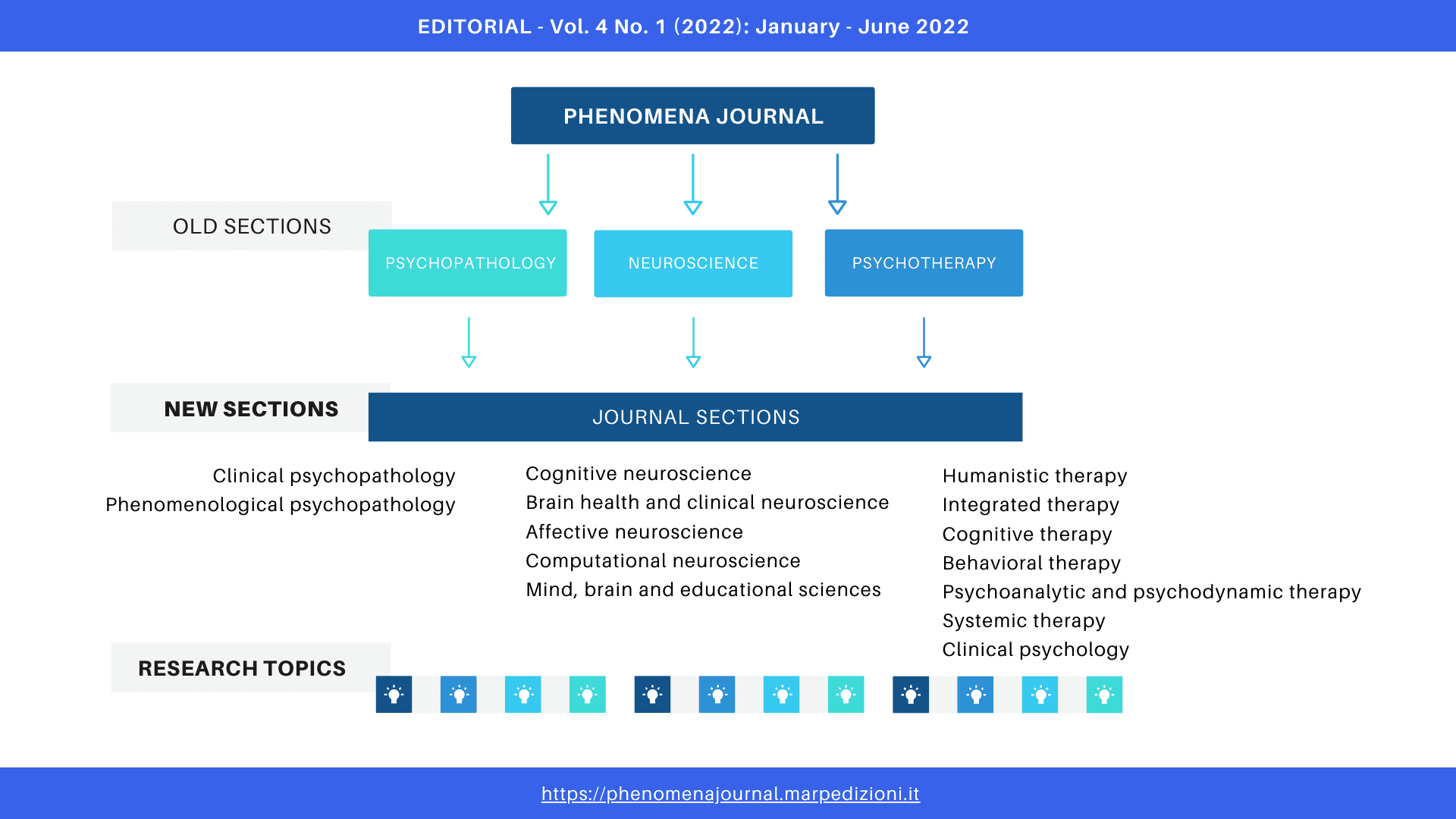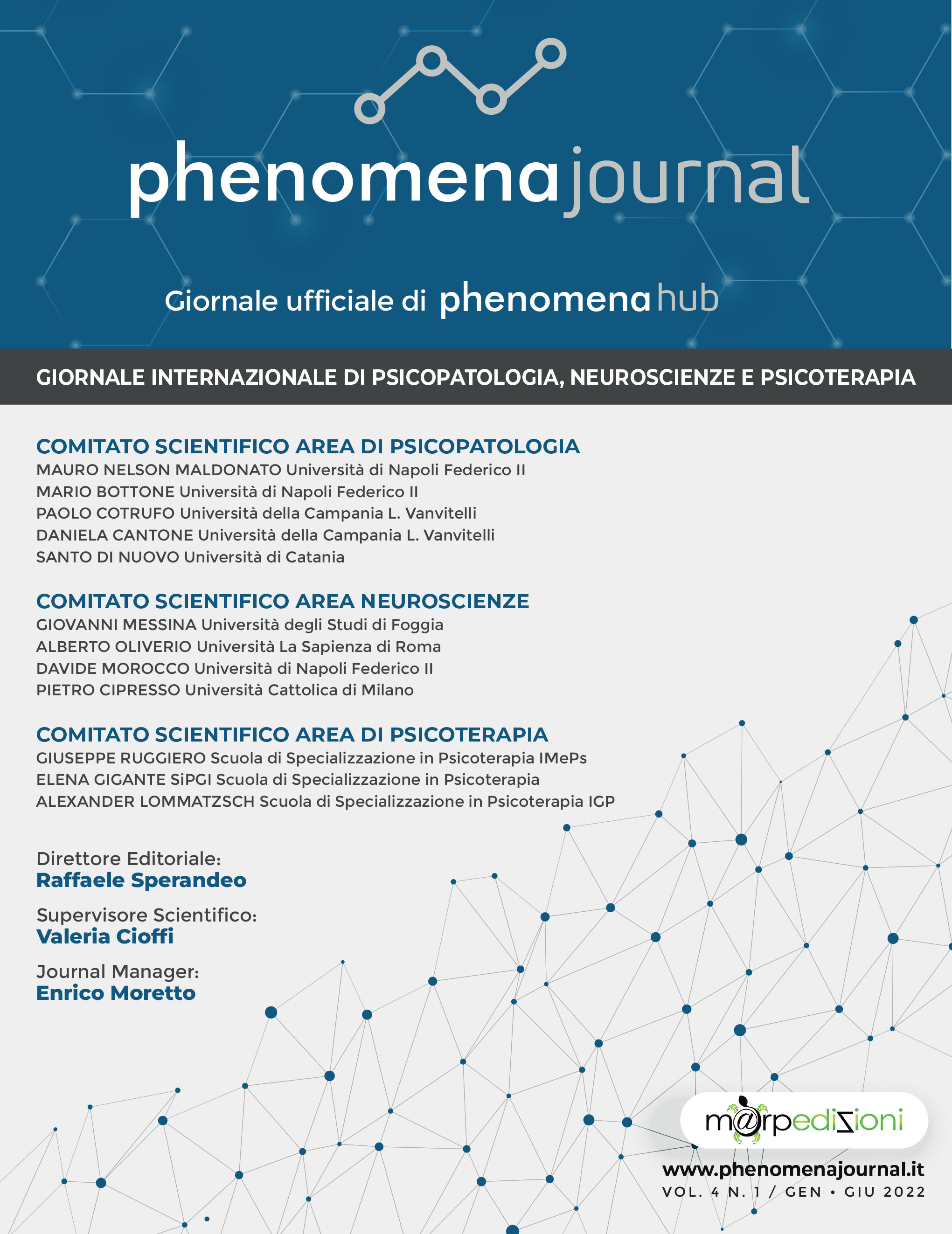Vol 4, No 1 (2022): January - June 2022
Issue Description
Phenomena Journal is a six-monthly journal written in double-blind peer review aimed at experts in the fields of Psychopathology, Neuroscience and Psychotherapy.
The journal aims to publish articles, reviews, methodological study hypotheses, opinion articles, produced by names of the national and international panorama of the sectors of interest of the magazine.
In addition, the newspaper aims to spread scientific culture in sectors that are not exclusively academic, such as clinical areas not specialized in research projects.
The newspaper, run by the Phenomena research group, published by Marp Edizioni, offers editorial support through a flexible and available way for all those who want to get closer to the world of Scientific Research.
The articles are available at www.phenomenajournal.it and are covered by an Open Access license.
EDITORIAL
ENRICO MORETTO e VALERIA CIOFFI
PHENOMENA JOURNAL TOWARDS NEW FRONTIERS
It is with pride and a certain satisfaction for the fruitful work undertaken, that we are pleased to announce, in conjunction with the completion of the launch of this year’s first issue, the updating of our platform.
This latter one, while remaining on OJS (Open Journal Systems), has been enriched in terms of editorial opportunities, following the typical complexity of the process that above all involves and accompanies scientific publications.
This renewal has also affected our policy, which, while maintaining the philosophy of open access, which makes the use and dissemination of scientific information free, has evolved in order to better match our advancement towards the complexity that is intrinsic to our way of thinking and acting.
While the digital revolution, symbol of the post-modern era, has facilitated the transmission of scientific information, broadening its impact as well as its communication potential, it has also posed what is now certainly a complex but largely outdated challenge concerning the possibility of integrating the opportunities of the Web with all publishing regulations, including that complex articulation of roles and codified models, now tested and amply validated, without distorting a model that is still valid.
In particular, digital scientific publishing makes it possible to meet the complexity of the publishing process by simplifying its implementation, through computerisation and thus the automation of work processes, in whole or in part, whereby information and/or tasks are passed from one actor to another to work according to a set of procedural rules (Workflow Management Coalition, 1996).
The updating of the journal’s platform has been made possible precisely thanks to the enjoyment of a technological and technical-scientific advancement that has allowed us to automate a series of editorial processes, elevating their complexity in favour of greater user-friendliness without violating their accuracy.
In particular, starting from the macro-areas the journal has always referred to, namely Psychopathology, Neuroscience and Psychotherapy, argumentative Sections (Humanistic Therapy; Integrated Therapy; Cognitive Therapy; Behavioural Therapy; Psychoanalytic and Psychodynamic Therapy; Systemic Therapy; Clinical Psychology; Cognitive Neuroscience; Brain Health and Clinical Neuroscience; Affective Neuroscience; Computational Neuroscience; Mind, Brain and Educational Science; Clinical Psychopathology; Phenomenological Psychopathology), entrusted to Section Editors. The latter will have the task of assigning the possible Guest Topic Editors the care of scientific productions of articles, with highly specialised contents on topics related to a specific scientific disciplinary field. Thus, while the Guest Topic Editor is expected to be a competent writer, capable of editing mostly single-topic special editions, as well as collecting updates and insights on the chosen topic, the coordination and general supervision of the entire topic publishing process is entrusted to the Session Editors.
The general intention is to expand our network of contacts and collaborations, promoting their internationalisation, in order to raise the level of the scientific quality of our productions, thus offering new opportunities for growth for our readers.


